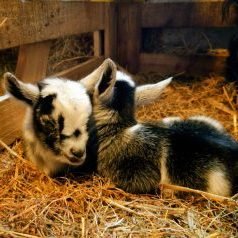Goat Information and Handy Tips
Pygmy Goats and Anglo Nubians are herding animals and do require company. Although they are healthy and hardy, a warm and dry shelter to protect them from the wind and rain will be necessary. Pygmy Goats and Anglo Nubians like to play and really enjoy climbing and jumping so enrichment should be provided.
A large garden or small field can be suitable for a couple of Pygmy Goats and Anglo Nubians, but ensure it is securely fenced.
They will need ad lib clean water and hay all year round and require daily feeding with a good quality goat mix. They browse rather than graze and are great for keeping the weeds down, but take care to remove poisonous plants from their land.
Pygmy Goats are not a dairy or commercial goat, but are lighter and easier to handle than the larger breeds. Anglo Nubians are a large breed goat and are much more docile than the little Pygmy Goats. They make supreb companions and often enjoy a walk, The Anglo Nubian is a dual-purpose goat, reared both for goat's meat and milk.

Requirements
Each goat should have ear tags in both ears showing the herd number and the goat’s personal identification number. These are unique to each goat and must be replaced with exactly the same number for traceability
You will need a County Parish Holding/CPH number and herd number. These can easily obtained from your local DEFRA office. They are both a legal requirement even if you choose to just keep a couple of goats in your back garden. You only require your own herd number if you wish to breed your own goats in the future.
Movement forms are used for goat movement between holdings. If you decide to buy some goats from us we can provide the movement form for you.
Hoof trimming approximately every 8 to 12 weeks, however this varies for each individual goat. Hoof trimming is much easier when their hooves are wet after rainfall. Katherine can provide you with a diagram and instructions to help you with hoof trimming if you're new to this. Hoof trimming shears are available at most farm suppliers or online.
Worming - Consult your vet for the correct wormer and dosage. Goats do need to be treated for internal parasites at least twice a year, normally in spring and autumn.
Vaccination - You can either ask your vet to vaccinate your goats for you or alternatively you can buy the vaccinations yourself. All our goats are vaccinated with Gudair against Johne's disease. Gudair is a one off vaccine and does not require a repeat. They are also vaccinated with Lambivac against Tetanus, Pulp Kidney and Dysentery. Lambivac requires an initial course for goat kids then a repeat vaccination every six months.
A mineral block should be provided that is suitable for goats, normally yellow.
Legal requirements for keeping and moving goats can frequently change. Up to date information can be obtained from your local DEFRA office or The British Goat Society or The Pygmy Goat Club.
Please don't hesitate to contact us if you have any further questions. We are happy to give further help and advice.
